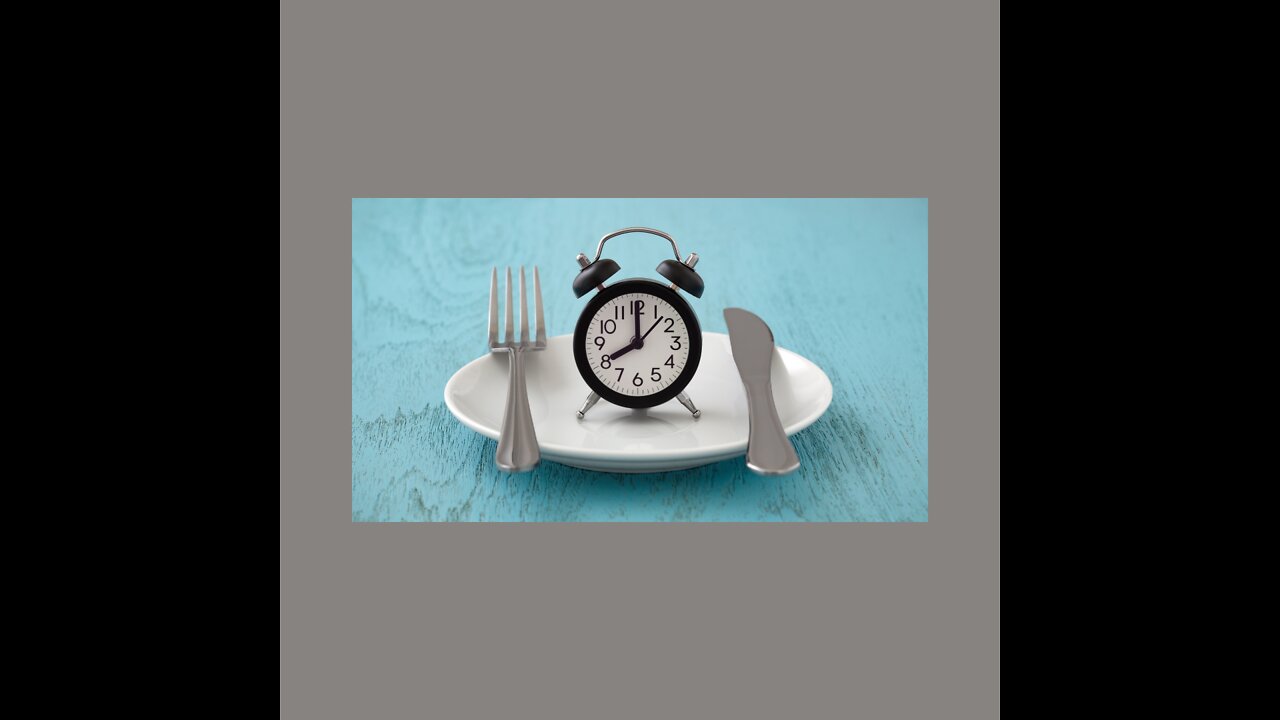Premium Only Content

Is Intermittent Fasting Right for YOU?
Should YOU try intermittent Fasting?
I’m certain you have heard about the enormous benefits of Intermittent Fasting (IF) or Time-Restricted Eating (TRE), right??
If not, then here’s the deal – IF/TRE is a practice of fasting for longer periods throughout the 24 hours of a day. And when I say “fast” I mean no calories at all.
There are many ways to approach IF:
1. 16/8 – fast for 16 hours then eat for 8 hours
2. 12/12 – fast for 12 hours and eat for 12 hours
3. 24/2 – yep, fast for 22 hours and eat for 2 (also known as the “snake diet”
4. 5/2 – eat normal 5 days per week and eat limited calories (500 calories usually) for 2 non-consecutive days a week.
WHY DO THIS? The reasons are plentiful for sure!
WHERE IT GOES RIGHT:
1. Stimulates autophagy – natural clearing of old, dead/diseased cells and replace with healthy cells – this improves lifespan/longevity
2. Shown to stimulate metabolism and promote weight loss and fat burning
3. Can decrease inflammation and oxidative stress as shown in inflammatory blood markers
4. Can improve insulin resistance
5. May improve immunity – it’s being used as a treatment for Covid Long Haulers
6. May Improve cognition/brain health
7. Many more…
WHERE IT CAN GO WRONG:
1. Eat too many pro-inflammatory foods or eat whatever
2. Eat too much
3. Wait too long to eat – some suffer hypoglycemic events
4. Eat too late/too close to bedtime
5. Dangerous if you had/have an eating disorder
6. Eat too little and suffer from nutrient deficiencies
7. Negatively impact fertility – not recommended while trying to get pregnant
8. Not recommended when pregnant or nursing
Tons and tons of studies have been performed on IF/TRE and those studies have shown amazing results.
Problem is that there are very, very few studies performed on women. They have exclusively been done with male subjects.
So many women I know have tried/are trying IF. It works beautifully for some and not so beautifully for others.
Many women try IF for weight loss, but most choose to fast when they wake until lunchtime - then they eat a hearty meal for lunch/late lunch and then eat dinner.
But many don’t feel better, lighter, or leaner.
This piqued my interest years ago – could it in fact be detrimental to some women?
Turns out, yes, it can.
So, why is that?
WOMEN ARE DIFFERENT FROM MEN! That’s why! :)
Women are much more predisposed and sensitive to stressors than men. And tend to have much more hormonal instability in general. That stress aims straight at our reproductive and thyroid hormones. When women are stressed it sends multiple signals to stop reproductive hormones and slow down thyroid hormones because it is telling the body we cannot be capable of reproducing - we are in “survival mode” and must shut down metabolism and simply focus on survival.
So, starvation and low body fat can have the exact same response in a woman – a large stressor – think of a gymnast who stops menstruating when their body fat is low. Their body has perceived they are under duress therefore could not be healthy enough to reproduce.
For women IF can be perceived as starvation (a major stress) very quickly. What happens next?
1. Perceived stress releases cortisol and decreases a hormone called kisspeptin
2. Cortisol release increases blood sugar and insulin resistance and starts the storage of abdominal fat as a protective mechanism (yeah, it’s a crappy way to protect, right!?)
3. Reduced kisspeptin reduces Gonadotropin-releasing hormone which reduces Luteinizing hormone and Follicle stimulating hormone which reduces estrogen and progesterone production – even short fasts can reduce all of them
4. Low estrogen causes mid-section weight gain, dementia, insulin resistance, bone loss and decreased metabolism
Therefore, we can see multiple mechanisms to cause negative results from IF in some scenarios – abdominal weight gain, general weight gain, insulin resistance, decrease in brain function, loss of bone, etc.
Women who are most vulnerable to a negative impact of IF seem to have hormonal instability – a time in life when hormones are already in flux – namely perimenopause (the time when reproductive age is ending but menstrual bleeding is still happening - roughly age 35-55).
But a big problem I see is that many women (and men) are struggling with unstable hormones at all ages – it’s almost an epidemic I see regularly these days – so it’s not just perimenopausal women as much.
But then there is a small study that showed fasting improved markers in women with PCOS (Polycystic Ovarian Syndrome).
So should YOU fast regularly? Whelp the jury is out. What I DO suggest is not take ANY dietary/health advice without it being individualized for YOU! In other words – if a practitioner tells you to fast regularly and you feel bad then do not do it. If you feel great and have health improvements, then it’s a good match for you. As I always say about diet – there is no one diet that everyone should do – I also say for IF/TRE. There’s no one style that works for everyone.
I personally find that I do my best with a high protein meal following my morning work out right after I wake. So that’s eating within 1 hour of waking – even if that’s 6am. And I eat until I am content and full and happy. Then I wait 4 hours and eat another protein-rich meal then another meal after another 4 hours. I like to leave at least 3 hours before bed with no food/calories. I also regularly test my hormones a few times/year. That’s how I feel my best. You need to experiment with different fasting tactics to see what makes YOU feel your best and work with your practitioner to individualize your approach!.
Regardless of how you eat and fast I strongly advise that every person should know if their hormones are balanced and properly detoxed for optimal health!
-
 3:29
3:29
Dr. Kelley Reis
2 years ago $0.61 earnedCholesterol: The Real Story
1.02K2 -
 LIVE
LIVE
FreshandFit
1 hour agoJoe Budden Arrested For Being A Perv! Tesla Cybertruck Explosion
2,277 watching -
 LIVE
LIVE
Kim Iversen
4 hours agoNew Year, New PSYOP?: The Fort Bragg Connection In The New Years Terror Attacks
3,097 watching -
 1:41:18
1:41:18
Glenn Greenwald
3 hours agoTerror Attacks Exploited To Push Unrelated Narratives; Facing Imminent Firing Squad, Liz Cheney Awarded Presidential Medal | SYSTEM UPDATE #381
33.2K47 -
 1:02:38
1:02:38
Donald Trump Jr.
7 hours agoNew Year’s Terror, Latest Breaking News with Sebastian Gorka | TRIGGERED Ep.204
103K223 -
 59:59
59:59
The StoneZONE with Roger Stone
2 hours agoAfter Years of Targeting Trump, FBI and DOJ are Unprepared to Stop Terror Attacks | The StoneZONE
5.52K4 -
 LIVE
LIVE
Leonardaisfunny
1 hour agoH-1b Visas: Infinity Indians
553 watching -
 DVR
DVR
Josh Pate's College Football Show
5 hours ago $0.07 earnedPlayoff Reaction Special: Ohio State Owns Oregon | Texas Survives | UGA vs Notre Dame Takeaways
213 -
 58:04
58:04
Kimberly Guilfoyle
5 hours agoFBI's Terror Response Failures, Live with Steve Friend & Kyle Seraphin | Ep. 185
76.9K36 -
 2:15:01
2:15:01
WeAreChange
6 hours agoMassive Developments In Vegas Investigation! UNREAL DETONATION, Shocking Details Emerge!
76.1K24